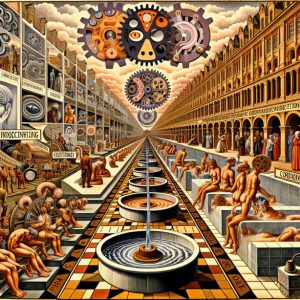
Carnosine Benefits: Harnessing Antioxidant Power for Health and Longevity
Updated Aprikl 30, 2024
Carnosine, a vital dipeptide formed from the amino acids beta-alanine and histidine, thrives within our muscle and brain tissues, playing a pivotal role in numerous physiological functions. Renowned for its antioxidant capabilities, anti-ageing, and disease-fighting properties, carnosine presents a promising avenue for health enhancement and longevity. This essay delves into the myriad of potential health benefits of carnosine, shedding light on its multifaceted contributions to human well-being.
The Dual Power of Carnosine: Combating Oxidative Stress and Aging
Carnosine, a naturally occurring dipeptide, stands out in the scientific community for its impressive dual capabilities in antioxidant protection and anti-ageing effects. This compound, composed of beta-alanine and histidine, is highly concentrated in muscle and brain tissues and is crucial in maintaining cellular health and longevity.
Antioxidant Powerhouse
Carnosine’s significant antioxidant properties are pivotal in safeguarding cells from the detrimental effects of reactive oxygen species (ROS) and reactive nitrogen species. These harmful free radicals, which can damage cells and accelerate ageing, are effectively neutralized by carnosine’s imidazole ring. Additionally, carnosine exhibits metal-chelating properties, binding to pro-oxidant metals like copper and iron, thus inhibiting them from catalyzing oxidative reactions that produce free radicals. This protective mechanism is vital in combating oxidative stress, a common denominator in numerous chronic conditions, including cardiovascular and neurodegenerative diseases and even cancer.
Reversing the Clock: Anti-Aging Effects
Beyond its role as an antioxidant, carnosine is renowned for its anti-ageing properties. It extends the Hayflick limit—the number of times a cell can divide before becoming senescent—and reduces the shortening of telomeres, protective caps on chromosome ends that deteriorate with age. These actions help maintain cellular division and function, directly countering ageing.
Moreover, carnosine has been shown to rejuvenate aged fibroblasts, revitalizing their growth rates, appearance, and protein synthesis to more youthful states. This rejuvenation is primarily attributed to carnosine’s ability to inhibit glycation. In this process, sugars bind undesirably to proteins, forming advanced glycation end products (AGEs) that accumulate and impair cellular functions. By mitigating AGE formation, carnosine not only slows ageing at a cellular level but also potentially supports skin health, enhancing skin elasticity and reducing the appearance of wrinkles.
Targeting Age-Related Diseases
Carnosine, a dipeptide composed of beta-alanine and histidine, exhibits a range of beneficial effects, including anti-aging and disease prevention, along with enhanced exercise performanc
Neurodegenerative Disorders
Carnosine shows potential in preventing and treating neurodegenerative disorders like Alzheimer’s and Parkinson’s disease. It achieves this by reducing amyloid-beta plaque formation and protecting neurons from amyloid-beta toxicity, which are crucial factors in Alzheimer’s progression.
Diabetes Complications
Carnosine’s ability to improve insulin secretion and reduce advanced glycation end product formation addresses diabetes-related complications. It showcases its therapeutic potential by tackling critical issues associated with the disease.
Cataract Prevention and Treatment
In animal models, carnosine has effectively prevented and reversed cataracts by inhibiting sugar-induced modifications to lens crystallins, thus preventing lens opacification, the primary cause of cataracts. This antiglycating capability is further explored in human trials using carnosine-infused eye drops.
Enhancing Exercise Performance
Carnosine has been identified as an exercise enhancer and is widely used in sports to improve physical performance and muscle gain. It positively affects energy and calcium metabolism and reduces lactate accumulation, resulting in enhanced exercise capacity.
Additionally, carnosine’s antioxidant properties scavenge free radicals and metal ions, contributing to its anti-ageing effects and overall health benefits.
Supplementation with beta-alanine increases muscle carnosine content, which is linked to improved exercise performance, particularly in high-intensity activities.
In summary, carnosine’s multifaceted benefits, from disease prevention to enhanced physical performance, make it a promising molecule in the field of health and wellness.
Enhancing Athletic Performance through Carnosine Supplementation
Carnosine, a dipeptide composed of beta-alanine and histidine, has gained significant attention in the sports and fitness industry for enhancing athletic performance, particularly in high-intensity activities. Supplementation with beta-alanine, a precursor to carnosine, has been shown to directly impact exercise capacity and performance.
Buffering Acids and Delaying Fatigue
One key mechanism through which carnosine exerts its performance-enhancing effects is by increasing the muscle’s buffering capacity. Strenuous exercise leads to the accumulation of acids, causing a decrease in intramuscular pH and contributing to muscle fatigue. Carnosine supplementation can increase muscle carnosine levels by up to 80%, enhancing the muscle’s ability to buffer these acids. This, in turn, delays the onset of fatigue, allowing athletes to maintain their high performance levels for extended periods.
Carnosine also plays a crucial role in calcium regulation within muscle fibres. It amplifies calcium release from the sarcoplasmic reticulum, increasing muscle contraction force. This effect on calcium regulation further contributes to improved athletic performance by optimizing muscle contractions during exercise.
The benefits of carnosine supplementation are not limited to a specific sport or activity. Research has shown that athletes in a wide range of sports, including kayaking, cycling, and combat sports, have experienced improvements in both exercise capacity and power through proper daily dosage and loading of beta-alanine supplementation. For example, in a study involving combat soldiers, significant elevations in muscle carnosine content were noted during a 30-day supplement period, along with improvements in endurance and focus, showcasing the real-world applications of carnosine supplementation.
Accelerating Recovery
Carnosine’s impact extends beyond performance enhancement to include accelerated recovery. Carnosine supplementation helps athletes recover more quickly from intense training sessions by reducing muscle damage and improving muscle repair. This enables them to maintain a consistent and intense training regimen, improving overall athletic performance.
Various factors, including dose, duration, and co-ingestion with meals, influence carnosine supplementation’s effectiveness. Proper dosing and loading protocols are essential to maximize the benefits. For instance, a meta-analysis concluded that with the appropriate daily dosage and loading, beta-alanine supplementation improved exercise capacity and power in athletes.
Carnosine’s Protective Role Against Oxidative Stress and Inflammation
Carnosine, a versatile dipeptide, exhibits powerful protective effects against oxidative stress and inflammation, making it essential for maintaining overall health and well-being. Oxidative stress, caused by an imbalance of free radicals and antioxidants in the body, can significantly damage cellular structures, including the peroxidation of fatty acid cell membranes. This, in turn, generates highly reactive alpha-beta unsaturated aldehydes, which can further propagate inflammation and cellular damage. Carnosine is a potent antioxidant and anti-inflammatory agent, offering multiple benefits to counter these harmful effects.
Scavenging Reactive Oxygen Species (ROS)
One of carnosine’s critical roles is its ability to scavenge and neutralize reactive oxygen species (ROS). ROS are highly reactive molecules that damage cellular components such as DNA, proteins, and lipids. Carnosine acts as a direct antioxidant, neutralizing ROS and interrupting the chain reactions that lead to cellular damage. By reducing the impact of ROS, carnosine helps protect cells and tissues from oxidative stress-induced injury.
Inhibiting Alpha-Beta Unsaturated Aldehydes
During oxidative stress, the peroxidation of fatty acid cell membranes can generate harmful alpha-beta unsaturated aldehydes, such as 4-hydroxynonenal (4-HNE) and acrolein. These highly reactive aldehydes can modify proteins and DNA, leading to cellular dysfunction and inflammation. Carnosine intervenes by directly reacting with these aldehydes, forming carnosine-aldehyde adducts, and rendering them inactive. This process prevents the aldehydes from damaging vital cellular components, reducing inflammation and promoting cellular health.
Anti-Inflammatory Actions
Carnosine exhibits anti-inflammatory properties by modulating the activity of inflammatory cells and cytokines. It inhibits the production of pro-inflammatory mediators, such as interleukin-6 (IL-6) and tumour necrosis factor-alpha (TNF-alpha), key players in the inflammatory response. By reducing the release and activity of these mediators, carnosine helps alleviate inflammation and associated pain and discomfort. Additionally, carnosine’s ability to scavenge ROS contributes to its anti-inflammatory effects, as ROS are known to trigger and perpetuate inflammatory processes.
Neuroprotective Benefits
Carnosine’s antioxidant and anti-inflammatory properties extend to the brain, providing neuroprotective benefits. Oxidative stress and inflammation are implicated in various neurodegenerative disorders, such as Alzheimer’s and Parkinson’s disease. Carnosine’s ability to scavenge ROS and inhibit the formation of advanced glycation end products (AGEs) helps protect neuronal cells and improve cognitive function. By reducing oxidative stress and inflammation in the brain, carnosine may contribute to preventing and treating these neurodegenerative conditions.
Carnosine’s potential benefits for cognitive function are also worth noting. Its ability to protect neurons from oxidative stress and cell death could have significant implications for brain health, potentially helping to prevent cognitive decline associated with ageing. Moreover, Carnosine’s potential to improve cognitive function in the elderly could make it a valuable tool in the fight against dementia.
Gastrointestinal Benefits
Carnosine also exerts its protective effects in the gastrointestinal tract. It helps maintain the integrity of the gut barrier and exhibits antimicrobial properties against harmful bacteria. By reducing oxidative stress and inflammation in the gut, carnosine contributes to overall gastrointestinal health. It may play a role in preventing gastrointestinal disorders associated with chronic inflammation, such as inflammatory bowel disease (IBD).
Other Benefits
Some additional potential carnosine benefits include:
– Wound healing – Carnosine has been shown to accelerate wound closure and enhance granulation tissue formation.
– Kidney protection – Carnosine reduces fibrosis and oxidative damage in kidneys, helping prevent chronic kidney disease.
– Anti-ulcer effects – Carnosine stimulates mucus production and cell regeneration in the stomach, promoting ulcer healing.
– Improved vision – Carnosine may protect against vision loss from glaucoma, retinal ischemia, and laser eye surgery.
– Enhanced immune function – Carnosine can stimulate the activity of immune cells like macrophages and T-cells.
– Reduced fatigue – Carnosine supplementation has been shown to decrease mental and physical fatigue.
– Improved heart health – Carnosine may benefit the cardiovascular system through antioxidant, anti-inflammatory, and anti-atherosclerotic effects.
Conclusion
Carnosine, a naturally occurring dipeptide, is a powerhouse of potential health benefits. Its antioxidant properties, which extend beyond merely scavenging harmful free radicals, contribute to maintaining cellular integrity and overall health. This is particularly significant in chronic diseases, where oxidative stress plays a pivotal role.
Carnosine’s anti-ageing effects are equally impressive. Its ability to extend cellular lifespan and rejuvenate aged cells could have far-reaching implications for skin health and the prevention of age-related diseases.
The potential of Carnosine in disease prevention is another exciting prospect. From neurodegenerative disorders like Alzheimer’s to metabolic diseases like diabetes, Carnosine’s multifaceted actions could be a game-changer in disease management.
Moreover, Carnosine’s role in enhancing exercise performance could be a boon for athletes and fitness enthusiasts. By buffering acids during intense exercise and enhancing muscle contraction force, Carnosine could help improve athletic performance.
Carnosine’s potential benefits for cognitive function, including its neuroprotective effects and ability to enhance cognitive function in the elderly, make it a promising candidate in the fight against cognitive decline and dementia.
Lastly, Carnosine’s other potential benefits, such as wound healing, kidney protection, improved vision, enhanced immune function, reduced fatigue, and improved heart health, further underscore its versatility as a nutritional compound.
In essence, Carnosine exemplifies the potential of targeted nutritional compounds in optimizing wellness and vitality throughout life. Its wide array of potential benefits, from antioxidant properties and anti-ageing effects to disease prevention and enhanced physical and cognitive performance, make it a valuable addition to any health regimen. As research continues to uncover the full extent of Carnosine’s benefits, it’s clear that this dipeptide has a significant role in promoting health and longevity.
Articles To Nourish the Mind

The Mob Psychology: Why You Have to Be In It to Win It

What Is Collective Behavior: Unveiling the Investment Enigma

What is the Rebound Effect? Unlock Hidden Profits Now

Dividend Collar Strategy: Double Digit Gains, Minimal Risk, Maximum Reward

Dividend Capture Strategy: A Devilishly Delightful Way to Boost Returns

BMY Stock Dividend Delight: Reaping a Rich Yield from a Blue-Chip Gem

Define Indoctrination: The Art of Subtle Brainwashing and Conditioning

What Is the Velocity of Money Formula?

What is Gambler’s Fallacy in Investing? Stupidity Meets Greed

Poor Man’s Covered Call: With King’s Ransom Potential

How to Start Saving for Retirement at 35: Don’t Snooze, Start Now

The Great Cholesterol Scam: Profiting at the Expense of Lives

USD to Japanese Yen: Buy Now or Face the Consequences?

How is Inflation Bad for the Economy: Let’s Start This Torrid Tale



